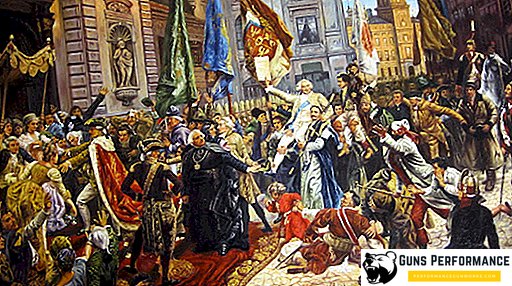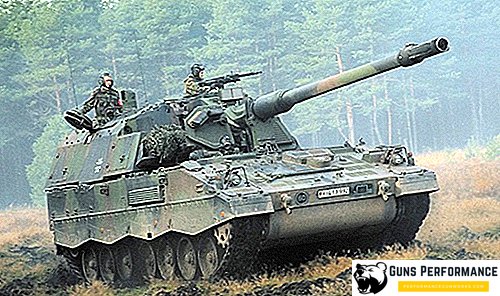
At present, the attitude towards Islam in the world can be called ambiguous. The reason for this is a real explosion of drive, which has been occurring in the Muslim world in the last few decades. Today, the rest of the world is watching with great surprise and apprehension the passions seething in the Middle East and Central Asia. No wonder, after all, religious wars last time shook Europe as far back as the 16th century.
However, it is unlikely that someone will be able to remain just an outsider of these terrible processes, the echoes of the storm are increasingly reaching the “civilized” world in the form of explosions and executions of innocent people.
Terrorism is one of the most serious dangers facing mankind today. It cannot be said that all Muslims are terrorists, but almost all current terrorists are Muslims. Alas, this is true. A modern European, American, or Russian has many Muslim religious symbols or concepts that are terrifying, for they are associated with terror or war against people professing another religion.

One of the worst words for the western and Russian inhabitants is "jihad" and "mojahed". It is with this concept that explosions, shootings of hostages, massacres and other manifestations of lawlessness and extremism are associated. In fact, the word "jihad" has become synonymous with terrorism, and "mojahed" is synonymous with religious fanatic. Afghan mojaheds declared Jihad to the Soviet troops, then separatists from Chechnya and the North Caucasus led it against the Russian federal troops, today radicals in Syria are fighting under the banner of jihad.
At present, in the public consciousness between the concept of "jihad" and the crimes committed in the name of Islam, there is practically an equal sign. But does this correspond to reality or is a similar opinion just a stereotype imposed by the media?

What is jihad?
In fact, everything is a little more complicated. Islam is a very complex and multifaceted religion, which has many currents and schools. In the Qur'an, jihad is one of the basic concepts, which means not so much war against the bearers of another religion, as manifestation of zeal in defending Islam and establishing it in the world. Jihad should not be identified with aggression and violence.
Translated from Arabic, this concept means "effort or struggle in the path of Allah." In the broadest sense of the word, jihad is any act aimed at spreading and protecting the principles and covenants laid down in Islam. That is, jihad can be called any struggle against evil and injustice, it does not have to be directed outward and waged with a weapon in hand.
Any spread (peaceful) of Islam among people is also jihad, and the person who does it is the mujahid. According to the Quran, every devout Muslim should not spare his strength and material means for such purposes.
If we talk more broadly, then jihad is a constant struggle that every Muslim must wage against his own passions and vices. Or, if you want, against the devil, who every second tempts man. Any right and noble deed is also a kind of jihad. If you saw that a person had lost a hundred dollars from his pocket and returned them to him, then you have overcome the temptation and won.
By the way, if we analyze all the meanings of the word jihad in the Qur'an, it becomes clear that in the overwhelming majority of cases it does not incite calls for violence. Some of them involve the struggle for God (faith) in a spiritual sense, most often jihad is the protection of their land or property, and only a few times this concept is associated with the struggle against representatives of other religions.

Jihad Types
This concept is one of the most complex and multifaceted in Islam.
There are several types of jihad. The most important of these is the so-called jihad of the heart. It means the struggle of man with his vices or nufs (animal component). It is believed that without winning this struggle, a person cannot get closer to God and preach the ideas of Islam to other people. This type of jihad can be called "basic".
The next level of this concept is the jihad of the language. It means that a believer can carry the ideals of Islam to other people, urging them to live according to Muslim rules. However, in order to preach, the believer himself must overcome passions and vices, that is, go through the jihad of the heart.
An even higher level of this concept is jihad hands. It means that a person with even higher development can stop someone else's wrong actions. For example, punish criminals. That is, a person does not just preach (jihad language), but actively acts.
The latest level is the jihad of the sword. It can only be resorted to as a last resort if there are no other ways to resolve the issue. That is, violence is allowed to use, if neither the word nor the action produces results.
There is another classification of jihad, which is based on Hadith. It distinguishes between a large (spiritual struggle) and a small jihad. The armed struggle that the faithful must wage to protect their land, loved ones, their own lives and, of course, the protection of the values of Islam (in the broadest sense of the word) belongs to the small jihad. Most often, a mojahed is a person who follows the path of a small jihad.
It should be noted that in Islam there is a huge number of interpretations regarding the jihad of the sword: when it can be applied, under what conditions, as well as about its methods and tasks.
That is, in theory, everything looks quite peaceful and quite decent, but in practice the term "jihad" is most often used to combat infidels.
We should not forget the historical context in which this concept was applied. The Prophet Muhammad did emphasize the peaceful side of jihad, but after this followed centuries of active expansion of the Muslims (not at all peaceful) and the struggle against numerous enemies who threatened the Islamic world. Here you can recall the Mongol invasion in the Middle Ages, which was a real shock for Muslims, and the Crusades undertaken against Europe by the East. It was during this period that the call for jihad became one of the main mobilization factors for the followers of the Prophet Mohammed.

How jihad and rules of war in Islam are declared
Naturally, not every Muslim can declare jihad and go to war. Such a decision is made by respected theologians, who must understand the situation in detail and only then express their will. The decision must be made by consensus.
In case of aggression, jihad is declared by default, and every Muslim should participate in it.
By the way, the Qur'an gives clear rules for the conduct of hostilities; they largely contradict what terrorists are doing today in Syria and Afghanistan. Islamic law, which is based on the Qur'an, lays down the rules binding on Muslims during military jihad.
They prohibit the killing and punishment of civilians, especially women, old people, children and priests. Also, these rules speak about the observance of agreements and treaties with the enemy and the desire to end conflicts as soon as possible.

History of jihad
The history of small jihad has more than XIV centuries. The first Jihad was announced by the Prophet Mohammed when he was campaigning against other tribes and cities of the Arabian Peninsula (beginning of the 7th century).
Muslims have repeatedly declared jihad against their opponents. For example, the Afghan mojaheds declared war on the British during the First Anglo-Afghan War in the middle of the 19th century. At the end of the 20th century, jihad was declared to Soviet troops that invaded Afghanistan.
A few words should be said about the meaning of the word "mojahed". It can also be interpreted in different ways. In a broad sense, a mojahed is a person whose efforts or struggle fits one of the definitions of jihad. The Mujahid must fight for the glory of Allah, and not for money, ambition or revenge. This definition fits not only a warrior, but also a priest or teacher who carries the knowledge or the word of God to people. Even a mother who is raising her child correctly is also a mojahed. However, it is not very correct to call terrorists in Syria or Afghanistan, who cut off unarmed hostages of the head or burn people alive.
Russia often declared jihad. The first time it happened at the end of the XVIII century, after the start of the war in the Caucasus. Then he was announced by Sheikh Mansur, the leader of the Chechens, who fought against Russia. At the beginning of the 19th century, Gazi-Muhammad made a similar appeal to Muslims. He called for Russia to declare a holy war and expel the Russians from the territory of Chechnya and the Caucasus. His struggle was continued by the famous Shamil, who united the mountaineers of the Caucasus and fought against Russian troops for several decades.
During World War I, Turkey declared jihad of Russia and the rest of the Entente countries. However, this appeal did not have much effect on the Muslims, who massively participated in the uprisings against the Ottoman Empire.
During the next World War, the Muslims of the USSR declared the jihad of Nazi Germany.
Jihad was declared by the USSR after the invasion of Afghanistan. The first jihad of modern Russia was declared after the start of the war in Chechnya. The last time he was declared at the end of last year by the terrorist group ISIS, after the start of the Russian bombing of Syria.












